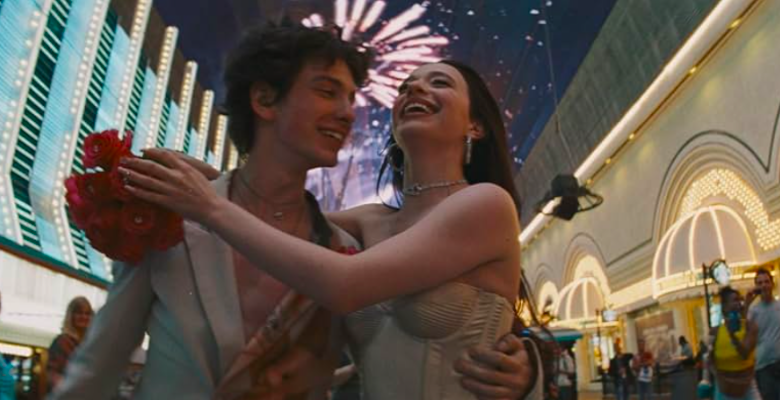‘Anora’: Sean Baker’s Dizzyingly Great Cinderella Story

Julie Maescher ‘27 / Emertainment Monthly Staff Writer
Light spoilers ahead
Sean Baker (The Florida Project, Tangerine, Red Rocket) has built his career crafting intimate, empathetic portraits of Americans on the margins; his latest, Anora, is his finest and most complete work yet, packaging his scrappy sensibilities into a more accessible and commercial mode without sacrificing any of his honesty or humanity. A high-wire balancing act of comedy and tragedy, Anora is almost dizzying to keep up with as it switches tones and defies expectations across its runtime – hilarious and exhilarating one moment, poignant and devastating the next. It’s a tremendous achievement, representing a stellar leap in form for Baker and an unquestionably star-making moment for lead actress Mikey Madison.
Madison plays the titular Anora (although she makes it clear that she prefers Ani), a lively and vivacious Russian-American sex worker at a New York City nightclub. It’s an honest, matter-of-fact livelihood for her; she goes about her business with her clientele, banters with her coworkers, and takes the train back to her modest apartment in Brooklyn. One day, Ivan (Mark Eydelshteyn), the son of an extremely wealthy Russian oligarch, walks into the club; he’s an aloof and carefree rich kid who freely tosses money around and asks for a dancer who speaks Russian. This brings him and Ani together; her Russian isn’t nearly as fluent as Ivan’s, but they hit it off regardless. Before long, Ivan is asking Ani to go “exclusive” with him and spend a week with him outside of the club. Ani enters a world of seaside mansions, private jets, and cocaine-fueled parties, and soon enough, Ani and Ivan are getting married on a whim during a trip to Vegas.
Baker shoots the first act as a raucous and electric roller-coaster ride through the whirlwind of young love, capturing the constant escalation of luxury and decadence in a fast-paced, exhilarating frenzy. But it’s not meant to last, and the film only truly kicks off once Ivan’s parents hear the news about the marriage back home. In order to annul the marriage, they dispatch their local Armenian fixer Toros (Karren Karagulian) to Ivan’s mansion; Toros brings along Garnick (Vache Tovmasyan) and Igor (Yuriy Borisov), two hapless goons meant to provide the muscle in removing Ani from the family’s business.
From there on, Anora takes a sudden heel turn into an entirely different kind of movie. As Ivan suddenly runs away from the mansion and Ani is forced to join the three fixers on an odyssey across New York City to track him down, the film takes on the madcap, freewheeling energy of a classical screwball comedy. When the film won the coveted Palme d’Or at the Cannes Film Festival in May, jury president Greta Gerwig compared Anora to “the classic structures of Ernst Lubitsch or Howard Hawks”. It’s certainly not an inaccurate comparison; it’s also hard not to think of films like Martin Scorsese’s After Hours (1985) or Jonathan Demme’s Something Wild (1986) embedded in its DNA. The film’s screwball mania is at its finest in a showstopping set-piece where the goons realize they’re wholly unprepared for the firecracker that is Ani, as she fends them off in an extended sequence of slapstick perfection.
Madison is a tour de force as Ani, brash and fierce but with a layer of vulnerability hiding underneath that slowly begins to peek through as the film progresses. Even after its shift into screwball farce, Anora evolves into yet another film in its final stretches, one where the weight of reality and heartbreak starkly begins to settle in. For all the fast-paced flash and mania on display in the film, Baker is ultimately a realist at his core, and Anora is distinctly in line with his prior films about exploitation and labor. This is ultimately a film about working people trying to survive inside a system built to exploit them; even Toros, Garnick, and Igor come to be portrayed sympathetically as workers just tossed around by Ivan’s family, sharing more in common with Ani than any of them may like to admit. This unexpected solidarity manifests itself in subtle and surprising ways, particularly between Ani and Igor.
Anora’s greatest achievement lies in how Baker navigates the tonal and stylistic switches of the film without ever losing sight of the empathy and humanity he provides his central character, as well as the supporting cast of characters surrounding her. It’s a tough needle to thread, but he pulls it off seamlessly, anchoring the film in a poignant and shattering emotional core. Without revealing too much, the film is ultimately rooted in the reality of a fantasy that wasn’t meant to last — and maybe was never truly real to begin with. But this is not to imply that these characters are left entirely without hope; Baker paints his characters with too much lived-in detail and affection for that to be the case, and the humanity is what lingers after the film’s breathtaking final moments.